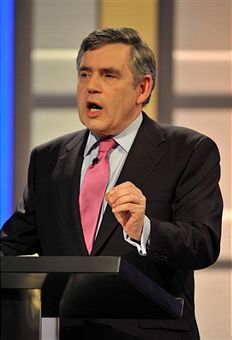 Yesterday, my postal vote went off and lacking a Plaid Cymru candidate far from my homeland I made do with the best of the rest. This is perhaps the most exciting election in the UK for many years as it seems likely that one result will be a change in the voting system, so that in future elections I will not feel I need to vote ‘tactically’, but more for the people, parties and policies that I most deeply support.
Yesterday, my postal vote went off and lacking a Plaid Cymru candidate far from my homeland I made do with the best of the rest. This is perhaps the most exciting election in the UK for many years as it seems likely that one result will be a change in the voting system, so that in future elections I will not feel I need to vote ‘tactically’, but more for the people, parties and policies that I most deeply support.
While this did not take me to the Labour fold at this election, one of the most surprising things about the general election campaign has been that throughout it, not withstanding gaffs along the way, I have found myself warming to Gordon Brown
This is not to say I agree with all his policies. Although in many ways his heart seems to be in the right place, he still reflects the streak of authoritarianism that has been a feature of British politics, Tory, Labour, and even to some extent Liberal, since the Thatcher years; like the popular sentiment in the US after Kent State, favouring the Jack-boot over the lily. But despite this, deep down he seems to care about helping the worst off in society; I guess an old style pub-at-the-corner socialist in an age of glass and steel wine bars.
It was clear in the very first TV debate that he lacked, or ignored, the presentation polish that is needed for our present media society. Answering his very first question, I remarked to Fiona the way he did not look into the camera, presumably (foolishly) looking at the one person in the audience who asked the question rather than the 10 million viewers whose votes he was seeking to attract.
What I hadn’t realised (although it has been reported occasionally I had missed it) is that he is blind in one eye and has failing sight in the other. So to look at the people in the audience, he needed to turn his whole head and thus was always looking to the right of camera giving an impression of lack of candour or confidence because he wasn’t looking us (the viewers) in the eye.
I’m not sure if Brown is Britain’s first disabled Prime Minister, and despite being noted for this1, he does not really see himself as disabled. However, in a world with anti-discrimination legislation everywhere, it is still a major problem for anyone seeking to influence the public. It has often been said that Franklin Roosevelt, as a man in a wheelchair, would never have become president in an age of public TV debates. Certainly Nixon’s knee injury was one of the factors leading to his defeat in the first US TV presidential debate2.
Last night, Brown was being interviewed by Jeremy Paxman. As in his TV debates, he did not have the media polish of a modern celebrity and several times betrayed some of the insecurity and defensiveness that led to his outburst about Gillian Duffy. However, mostly he seemed genuinely struggling to understand why when he laid out economic policy straightforwardly and, to his mind, simply, it did not communicate.
 I have been reading “Elizabeth and Her German Garden” by Elizabeth von Arnim3. At one point she describes her frustration vainly trying to explain her plans for the garden to her gardener who seemed to prefer “cooks to marigolds”:
I have been reading “Elizabeth and Her German Garden” by Elizabeth von Arnim3. At one point she describes her frustration vainly trying to explain her plans for the garden to her gardener who seemed to prefer “cooks to marigolds”:
“It is dull work giving orders and trying to describe the bright visions of one’s brain” (p119)
Gordon Brown seemed similarly to struggle to understand the ignorance of the world around. His grasp over the economy seemed strong and clear. However, as in a Hollywood disaster movies, he was in the role of the expert aware of the impending exploding volcano, collapsing building, or fiery comet, yet unable to communicate the rafts of computer print outs and equations to an uncomprehending world.
While Paxman pressed him on why he hadn’t foreseen the global economic collapse, it became clear that in fact since 1998 he had been campaigning for a global watchdog that might have been able to reveal the signs of this and other potential failings in our interlinked and precarious world of international finance. Yet his fellow financial leaders, just like the public and Paxman, did not believe him. It seems that behind the closed doors of international diplomacy, as in the TV debate, it is appearance not substance that wins the day. It is no good being right if you cannot convince others. Cassandra calling.
But his incomprehension of others lack of comprehension, may not be his greatest flaw.
 Some years ago, a friend accused me of integrity, in the knowledge that this is a dire failing in modern society. In fact, I know that I do not suffer this ailment uniformly or continuously, but obviously enough to elicit sympathy from him for this disabling condition. Looking at Gordon Brown I wonder if this is perhaps his second disability. I get the impression he actually attempts to do what he believes in, and, indeed, as his in-private but on-microphone remarks revealed, is flustered by needing to put on a public image. It is not clear whether Nick Clegg’s disarming naivety is simply slick public image, or is in fact signs of the same disabling condition, time will tell.
Some years ago, a friend accused me of integrity, in the knowledge that this is a dire failing in modern society. In fact, I know that I do not suffer this ailment uniformly or continuously, but obviously enough to elicit sympathy from him for this disabling condition. Looking at Gordon Brown I wonder if this is perhaps his second disability. I get the impression he actually attempts to do what he believes in, and, indeed, as his in-private but on-microphone remarks revealed, is flustered by needing to put on a public image. It is not clear whether Nick Clegg’s disarming naivety is simply slick public image, or is in fact signs of the same disabling condition, time will tell.
Of course, some politicians have succeeded, despite this failing, notably Margret Thatcher, but it is the exception that often proves the rule. In the end while Gordon Brown’s visual disability is problematic, it is something a good (NHS) optician can help with in the office, and well-paid image consultant could deal with for the TV. However, you cannot air-brush the soul, and perhaps it is this deeper disability in his character that in the end makes him fundamentally, at a social, personal and political level, unfit for public office.
- See BBC News Aug. 2006 “Brown heads disabled power list“[back]
- See reports of the debate on Wikipedia “United States presidential election debates” and JFK Library “JFK in History:Campaign of 1960“. Also video in the Bolton News “Party leaders gear up for debate“.[back]
- A beautiful book. The edition I am reading was published by Macmillan, 1909, but also available in Virago Modern Classics “Elizabeth and Her German Garden“. Also available in[back]
‘Unfit for office’? – what a silly comment, this man (Gordon Brown) has with some success occupied the two most powerful position in the State for the past 13 years. Brown was certainly our most successful Chancellor – but maybe that’s just because I’m old enough to remember ‘Black Wednesday’ and the fiasco of John Major and Norman Lamont dithering over the exchange rate mechanism whilst mortgage interest rates hit 15%. Its clear that Brown played a major part in ensuring that the world banking system didn’t collapse – for which strangely he now seems to be blamed. Could you really envisage either Cameron or Clegg coping with that kind of crisis? Cameron would just have turned red and blustered whilst Clegg would have just waved his arms around and asked why can’t we all be friends…Brown also clearly understands the economy and economic forces far better than Cameron or Clegg or Paxman to whom he had to carefully explain the difference between cuts in public expenditure to control inflation and cuts in public expenditure in a time of recovery without inflation – not that the explanation seemed to penetrate Paxman’s dense skull.
The fashionable off-hand belittling of Brown reminds of something John Sargent said on ‘Questiontime’ after the first debate, when someone casually disparaged Brown and Sargent pointed out that these kind of comments were ridiculous, Brown has been doing these jobs, making these difficult decisions whilst other have had the luxury of just talking about them. It also sort of reminds me of the Jack Nicholson speech in ‘A Few Good Men’ – that Brown has had a greater responsibility than you can possibly fathom… that you have the luxury of not knowing what Brown knows.. that you don’t want the truth. ..because deep down, in places you don’t talk about at parties, you wanted Brown there…
The only revealing thing that Paxman said during his rather poor and (I thought) bullying interview was that people don’t like Brown. People clearly don’t like Brown, and this has made him the target for all kinds of tactics including a press pack determined to ‘get him’ for a range of, usually monetary inspired, reasons. So we have the Rawnsley, ‘Brown shouts at people’ (gosh, that’s news) or the ‘bigotgate’, ‘Brown says different things in public to what he says in private’ (of course none of us do that – and anyway whose behaviour was worse, Brown’s or the gaggle of journalists who pursued that poor woman like a bunch of schoolyard tell-tales?). People don’t like Brown – why? I don’t know, maybe he lacks some social charm, maybe people are determined not to like him. Like children who get victimised at school there is no real rhyme or reason to it.. maybe they look odd, maybe they are good at Maths, who knows?.. but the fact that they are disliked apparently makes all kind of unreasonable treatments and comments suddenly acceptable. Although he is our Prime Minister, Brown seems to be in this kind of position and consequently people (Paxman, you) feel free to treat him or say things you should probably think more carefully about but obviously don’t… ‘warming to Gordon’ should involve no more than treating him with the respect he deserves.
Mark, I was being ironic!
Pingback: Alan’s blog » Gordon’s example to us all